Radical Birthwork as an Act of Resistance
By Ynanna Djehuty
I like to open with definitions. The usage of words and knowing the weight they hold is important to all discourse, regardless of whether we are conscious of their weight or not. For this piece, I want to define the key words in its title so I may offer the reader context:
The word radical comes from the Latin radix, “root,” as in “going to the origin, to the essentials.”
What is birthwork? Normally, it is used to refer to a midwife and/or doula. The meaning of midwife is “to be with women,” and doulas serve a similar function. I think of birthwork also including the network of grandmothers, sisters, aunts, and other wise women who offer the deepest emotional support. Without a doula present, that role is organically present in a female companion being with the laboring woman.
Resistance (n): from French résistance and Latin resistentia, meaning “organized covert opposition to an occupying or ruling power.”
To radically transform our communities, we must start at the foundation of our issues. People of the African Diaspora have not yet been able to properly heal the trauma of enslavement. The oppression is constant, and has been systematically focused on dehumanizing Afro-descendant people. The destruction of the family unit and suppression of their history is a key factor in how white supremacist patriarchal ideologies have caused so many disparities and chronic disenfranchisement. In particular, the very nucleus of creating family—birth—has been compromised by the medical system through removing midwives and birthworkers from the community.
“If we hope to create a non-violent world where kindness replaces fear and hatred, we must begin with how we treat each other at the beginning of life. For that is where our deepest patterns are set. From these roots grows fear and alienation or love and trust.”-– Suzanne Arms
Midwives play an important role in healthy outcomes for mother and infant. As a woman’s primary health provider, midwives have traditionally cared for all aspects of a woman’s reproductive well-being. Many of us are not aware or have been kept unaware that midwives are an option and, in many cases, a much more holistic and compassionate one. In African-American communities, the midwife is one category of healer who survived the Middle Passage. In this country, they were the primary go-to person for both enslaved African women and their white mistresses. They had the knowledge of herbs and traditional healing methods and also mothered the mother. Mama Sarahn Henderson describes the role in her article, “The Cauling of Midwife: A Historical Journey of Midwifery Through the Hands of Midwives of African Descent”:
“Midwives of African descent have an origin and a story of her own. A history that is deep rooted in the culture of her ancestors of hundreds of generations from across the waters, which survived the middle passage of slave trading, bringing with them their knowledge of birth and medicinal botanical roots. In many African villages there was not just one particular woman who was known as the Midwife of her village. That is why it is difficult to find an African translation to the word midwife. Birthing was looked on as being women’s work and older women who had given birth before assisted another during labor. Oftentimes it would simply be the birthing woman’s mother or grandmother and other women to help.”
What has kept our mothers and family structures alive has been the intimate network of support received from grandmothers, sisters, aunts, and wise women from their tribe. The environment around a pregnant women and the mental, emotional, physical, and spiritual support she receives sets the stage for her journey into motherhood and the life of her children. Being ripped from our motherlands and having our cultural traditions invaded and forgotten has made our communities hostile environments. A woman of color already suffers from racism, sexism, and economic inequalities; to be a mother in a society that continually dehumanizes her is to struggle with her own inherited and experienced trauma while raising the future generation.
The enslavement was the beginning of the shattering of the family structure. It was common for families to be separated, with parents and children being sold to different plantations and masters. Five hundred years worth of this traumatic separation plus the aftermath of abolition, coupled with incredible amounts of abuse such as regularly being whipped, assaulted, lynched, raped, and castrated, among other horrors, has created a rotten foundation for our contemporary Afro-descendant families. Women of color began to lose the knowledge from their mothers, thus experiencing childbirth in terrible conditions without maternal support. The midwife and birthworker served to address this emergency in her community. To serve and do this work is an integral part of the spirit of resistance that African people have passed from generation to generation.
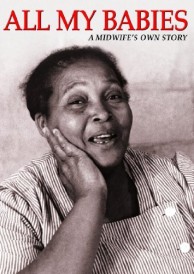
From the film “All My Babies – A Midwife’s Own Story” about “Miss Mary” Coley, an African-American midwife in rural Georgia. (Georgia Department of Public Health/UNESCO)
The Afro-descendant midwife would regularly visit the pregnant women she served at their homes, teaching them how to properly nourish themselves and how to take care of the coming baby. Midwives would help women prepare for the birth process and assist in the delivery; the midwife and/or her assistant training to be a midwife would then spend about two to three weeks with the mother, helping prepare the food, taking care of the mother, doing the house work, and generally helping her adjust to the new baby. The granny midwife, as many of the midwives at this time were usually mature older women, had remarkably impeccable records of virtually no infant or maternal deaths. In The Archaeology of Mothering: An African-American Midwife’s Tale by Laurie Wilkie, the details of how nurturing the granny midwife role was. It was a service to the community and also that came from experience of the midwives’ own knowledge from rearing her own children.
The traditional midwife felt called to respond to the needs of her community. They were primarily trained by apprenticeship with older midwives and would practice as such once they had their own children. In the community, the midwife role was backed by the deep spiritual inclinations of her work and thus, she was regarded in a position of prestige. She would be compensated financially or through an exchange of service; she served regardless of payment. And yet, this last battalion against the sickness of the dominant white supremacist culture was attacked viciously.
Specifically in the United States, the medical establishment began to systematically remove granny midwives from their communities around the 1920s. Doctors were beginning to make a name for themselves through experimentation and practicing on women and, being a capitalist patriarchal institution, medicine needed to remove the competition of holistic practitioners so physicians could control the market. Demanding that lay midwives be licensed, followed by not processing and honoring the applications, was one way doctors began to dwindle the numbers of midwives. They also began to spread lies about granny midwives, demonizing them and making propaganda telling women that they were unclean, ignorant witch doctors. By the 1940s, lay midwives had disappeared from the communities, and birth went from being a natural event to a pathological disease that needed to be managed. Obstetricians essentially wanted to remove the granny midwives so that they could experiment on women of color in their classrooms and hospitals (From the lecture, “Killing the Medical Self-Help Tradition among African Americans: The Case Of Lay Midwives in North Carolina, 1912 – 1988).
Reviving the presence of the midwife and community of supportive women such as doulas, mothers, grandmothers, and related women is a piece of the solution to changing the course of our community’s current reality and future. Organizations such as the International Center for Traditional Childbearing are centered on the necessity of increasing the number of Black midwives, doulas and healers to serve in this precarious situation. Empowering women to trust their bodies and innate wisdom can and will cause a profound transformation in our communities. In conjunction with grassroots movements addressing various issues in our neighborhoods, rebuilding the sacred space around our birthing mothers can lead to a ripple effect that starts at the very core of our existence. Our connection and nurturance to and from our mothers and family units are sites of remarkable potential for growth and healing. To erase the social injustice is to be in solidarity with giving future generations healthier lives and outcomes.
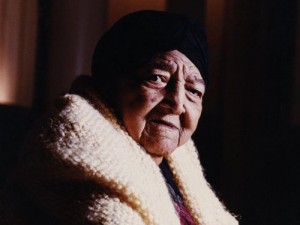
Margaret Charles Smith, one of the last granny midwives from the Southern United States. Miss Margaret practiced for 28 years, until Alabama outlawed midwives in 1976.
For our communities to rise out of the shackles of imperialism and colonialism, we must engage in a conversation about the most grassroots issue that exists: childbirth and rearing. Our movements would do well to be strung together in solidarity working not only to transform the conditions we have been living and dying in, but to also support the mothers, families, and birthworkers to give light to healthier generations that will break the cycles of oppression. What is a grassroots movement without the seeds? What is our work without an able-minded youth to pass it onto? We must focus on eradicating violence during conception, pregnancy, and childbirth to serve as the foundation for the rest of our social justice work.
Resources
Motherwit: An Alabama Midwife’s Story, by Onnie Lee Ogan
Unnatural Causes: When the Bough Breaks
Miss Margaret (a documentary)
W. Eugene Smith’s Photoessay, “Nurse Midwife”
________________________________
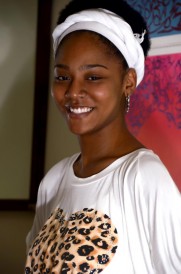 Ynanna Djehuty is an Afro-Dominicana born and raised in the Bronx. A writer and certified birth doula, she is a member of the International Center for Traditional Childbearing (ICTC). The focus of her work is the empowerment of women and people of the African Diaspora, specifically discussing the Afro-Latina Identity. She utilizes her experience as a birth doula to raise awareness about maternal and infant health for women, highlighting the disparities in the healthcare system in the United States for women of color. She is studying to become a midwife to continue to advocate for women and their overall well-being.
Ynanna Djehuty is an Afro-Dominicana born and raised in the Bronx. A writer and certified birth doula, she is a member of the International Center for Traditional Childbearing (ICTC). The focus of her work is the empowerment of women and people of the African Diaspora, specifically discussing the Afro-Latina Identity. She utilizes her experience as a birth doula to raise awareness about maternal and infant health for women, highlighting the disparities in the healthcare system in the United States for women of color. She is studying to become a midwife to continue to advocate for women and their overall well-being.

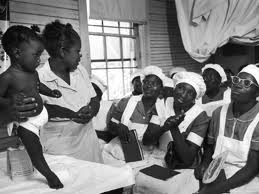
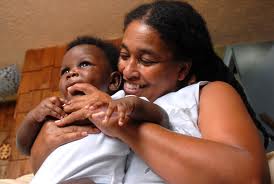

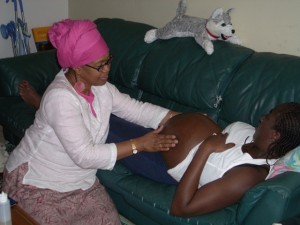



4 Comments